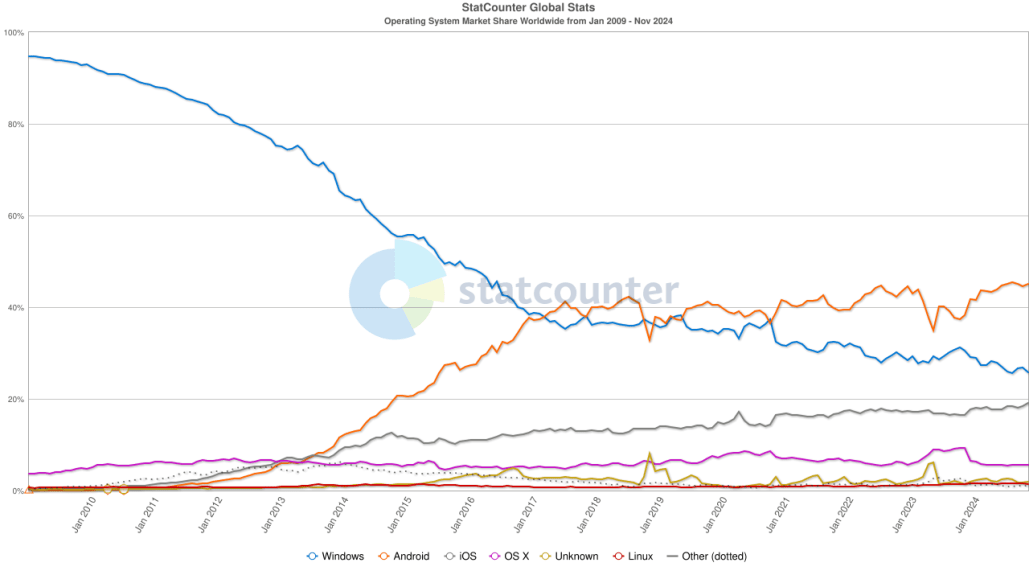The U.S. Department of Justice (DOJ) filed late Wednesday, calling for Google to divest the Chrome web browser and suggesting the possibility of spinning out Android. Following the news, Alphabet, Google's parent company, saw its share price drop by nearly 5%.
While the general sentiment suggests this is bad news for Google, I think otherwise.
This isn’t the first time browsers have been at the center of antitrust action. Microsoft faced a similar challenge in the 1990s when Internet Explorer (IE) rapidly gained market share by being bundled for free with every Windows operating system. This strategy led to its widespread adoption. However, antitrust enforcement eventually required Microsoft to allow PC manufacturers to pre-install other browsers and enable users to uninstall IE, appeasing regulators.
This created an opportunity for other browsers to gain market share, and history shows that Google Chrome eventually won the browser war. Chrome’s success was largely driven by the popularity of Google Search and Gmail, as well as its superior speed and stability compared to competitors like Firefox. Users flocked to Chrome for its seamless integration with other Google services.
Fast forward to today, we find ourselves in a situation reminiscent of Microsoft’s dominance with IE. DOJ seems to view Google’s browser dominance stems from the widespread adoption of Search, and, most notably, its ubiquitous Android operating system.
Android is not only the most popular mobile OS but also the most widely used operating system globally, surpassing even Microsoft Windows.
The argument or concern, therefore, is similar: leveraging a dominant OS to secure the adoption of its own software. However, this view is increasingly outdated.
Google Search remains the cornerstone of Google’s business empire and its most critical revenue driver. While Android contributes to revenues through the Play Store and Google Pay, its financial impact is relatively minor compared to Google’s ad business. Everything hinges on the continued usage and dominance of Google Search.
Critics argue that the default use of Google Search in Chrome and Android strengthens its search dominance. Chrome and Android also prompt users to log in, simplifying access to other Google services. This integration allows Google to identify users and collect behavioral data, enabling more targeted ads and higher ROI for advertisers. In essence, Chrome and Android help de-anonymize user data.
While these points are valid, it’s inaccurate to claim that Chrome and Android were crucial to Google Search’s initial adoption. Google Search predates both and arguably drove the adoption of Chrome and Android rather than the other way around. In the early days of Chrome and Android, Google Search’s popularity played a significant role in their success. Today, while there is a flywheel effect—where Chrome and Android contribute to Google Search usage—the search engine’s continued relevance depends on being the best and most widely used, not on its ecosystem.
If Google Search were to lose its position as the leading search engine, neither Chrome nor Android could reverse that decline.
A far greater existential threat to Google Search comes from the rise of AI. Generative AI platforms like Perplexity and ChatGPT are changing how users search, offering concise and direct results. Google has responded with Gemini-powered AI-assisted search features to stay competitive. However, platforms like Perplexity and ChatGPT operate through standalone applications, bypassing browsers entirely.
It’s unclear whether user behavior will eventually shift away from traditional search engines to AI-driven alternatives. For now, Google must focus on maintaining its search engine’s relevance while rolling out new features. As long as Google Search retains its dominance and cultural mindshare—symbolized by the phrase "Google it"—the company should remain on solid ground.
Losing Chrome would not be catastrophic for Google. Any browser can still use Google Search, and users can manually set it as their default, that is, if Google Search remains the most desirable search engine. Divesting Chrome could even appease regulators and resolve antitrust lawsuits. This would allow Google to retain Android, focus on maintaining Google Search supremacy, and expand other areas like Google Cloud.
In conclusion, while divesting Chrome may seem like a loss, it would likely only have a short-term impact on Google’s core business. Google Search’s dominance, not Chrome, is the foundation of Google's success. By focusing on its search engine and adapting to evolving technologies, Google can continue to thrive.






